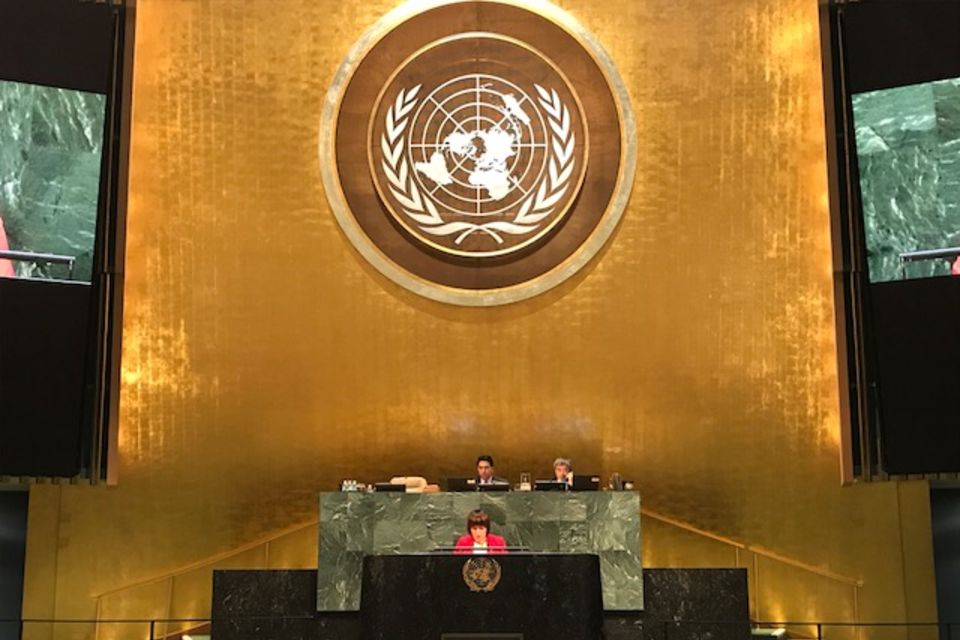Statement by the Deputy Minister for Social Affairs of Ukraine Ms. Nataliia Fedorovych at the UNGA meeting on the appraisal of the United Nations Global Plan of Action to Combat Trafficking in Persons

Mr. President,
Mr. Secretary-General,
Excellencies, distinguished participants, ladies and gentlemen,
We commend convening of this high-level meeting to assess achievements, gaps and challenges in the implementation of the Global Plan of Action to Combat Trafficking in Persons.
Trafficking remains a real threat to peace, human rights, democratic governance and the rule of law, as well as socioeconomic development.
Ukraine reiterates its support and full adherence to the implementation of the Global Plan of Action to Combat Trafficking in Persons.
In recent years, we observe a significant evolution of forms of trafficking in persons, especially in conflict and post-conflict situations.
In various parts of the world, conflicts encompass a wide range of forms of exploitation, including or involving sexual violence, forced labor, slavery, compelled unlawful recruitment of children into armed service in conflict situations.
Another aspect of the issue is that persons displaced by conflict, including refugees, can be especially vulnerable to all kinds of exploitation.
In this regard Ukraine fully supports the commitments in the New York Declaration for Refugees and Migrants to combat human trafficking, including through targeted measures to identify, protect, and assist victims, as well as to prevent human trafficking among those affected by displacement, taking into account the particular vulnerabilities of women and children.
We also lend our support to the Inter Agency Coordination Group against Trafficking in Persons (ICAT), which must be an efficient tool for coordination of joint efforts.
On the other hand, I would like to mention another issue that is of great importance for all of us. Namely, accountability and prosecution of perpetrators guilty of trafficking in persons and crimes of sexual violence in conflicts. Widespread impunity is unacceptable because the repetition of such crimes creates a vicious circle of delinquency. Along with the provision of psychological, social and medical support to victims, we see the fight against impunity as a key priority area.
Mr. President,
Ukraine supports international efforts to combat all forms of human rights abuses and violations in conflict and post-conflict situations. We remain strongly committed to eradicating trafficking. Unfortunately, my country has not been immune to this problem.
The fight against this horrendous phenomenon is on the top of the agenda of the Ukrainian Government activities in the field of human rights.
Over the past decade, Ukraine has made a number of important steps towards the establishment of a viable nation-wide counter-trafficking response and setting up a government-owned National Referral Mechanism to identify, assist and protect victims of trafficking.
Ukraine’s ratification of key international acts in the area of combating human trafficking, including the UN Convention against Transnational Organized Crime and Protocol to prevent and punish trafficking in persons, especially women and children (2004), the Council of Europe Convention against Trafficking in Human Beings (2010), as well as adoption of the Law of Ukraine "On combating human trafficking" in 2011 and of the National counter-trafficking action plan for 2016-2020 – are just a few concrete examples of the steps undertaken in our fight against this hideous phenomenon.
With regard to child protection from exploitation and abuse, Ukraine is a party to the UN Convention on the Rights of the Child and its Optional Protocol and the Council of Europe Lanzarote Convention.
Let me note, however, that all of the aforementioned documents currently cannot be properly implemented in non-government-controlled areas of Ukraine. Three years of Russian aggression against Ukraine have led to increased risks of human trafficking in Ukraine. We have also seen numerous cases of human trafficking and forced labor - and even slavery - in certain areas of the Donetsk and Luhansk regions outside the control of the government. But these cases remain largely unaddressed due to the lack of both safe access and proper attention of the monitoring missions, especially by HRMMU and SMM OSCE, as well as UNICEF and ICRC.
The situation is complicated by the 400 kilometer section of the State border with the Russian Federation, which is out of Ukraine’s control and widely used for the inflow of weapons, ammunition and fighters into the zone of conflict. The victims and perpetrators of trafficking in persons are also moving across this uncontrolled section of the border.
In this regard, we have to be aware that Russia does not have comprehensive mechanisms for effective investigation, prosecution and punishment of perpetrators according to the Convention against Trafficking in Human Beings. Today, among all member-states of the Council of Europe, only Russia has not joined this Convention.
Mr. President,
Trafficking is a blatant violation of human rights, an offense against the dignity and integrity of a person. The success of our common fight against this scourge requires the effort of all concerned. The long-term solution can only arise from consistent political commitment and the joint action of the international community to eradicate human trafficking, to promote justice and accountability, and to protect victims.
I thank you.
